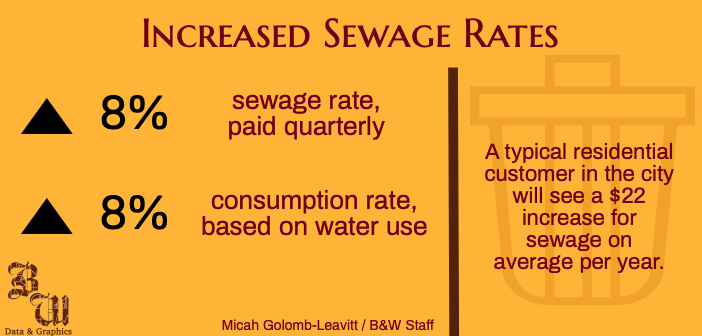Sewage rates in the city of Bethlehem will be seeing an eight percent increase starting Jan. 1, 2020.
Edward Boscola, the director of water and sewer resources in Bethlehem, said Bethlehem City Council passed an ordinance in November to increase the rates.
The changes will affect residents in two ways.
Boscola said there will be an eight percent increase on the flat rate, which residents pay on a quarterly basis. There will also be an eight percent increase on the consumption rate based on how much water customers use, according to their meter reading.
Jarod La Selva, ‘20, lives off campus near Goodman Campus and will be affected by the changes. La Selva said he was not surprised by the increase and is not opposed to paying more.
“When there are increases like that, there’s likely to be a reason behind it,” La Selva said.
Boscola said the rates need to go up to fund the sewer revenue. Without the increase, funds would stay flat.
There also are not many new customers paying each year, since the city of Bethlehem is not expanding much more, Boscola said.
“To keep up with inflationary pressures and to make sure we have an adequately funded capital program, we unfortunately have to raise rates every few years,” Boscola said.
Bosocola said the sewage rates go up every three years — the most recent increases were in 2017 and 2014.
More specifically, the money mostly goes toward equipment, material and payroll. The sewage system is also aging in Bethlehem, so money is saved to go toward larger projects to maintain the current system.
Brett Irwin, a manager and analyst at Fifth Street Properties, said it is not ideal to raise rates, but Bethlehem residents will indirectly see the benefits and paying more for sewage is a worthwhile investment.
He said he expects an increase of about $5 to $10 per person per year for his tenants.
“From our perspective, it’s a standard increase,” Irwin said.
Boscola said a typical residential customer in the city will see a $22 increase on average per year.
No one has spoken about the increased rates at City Council meetings or brought it up to the mayor since the ordinance in November. Boscola said he has not received any complaints.
“People tend to see this as the cost of business, and it’s expected that these things will go up every couple of years,” Boscola said.
Jeanne Rossi is an operations manager at Keystone Property Management & Maintenance in Bethlehem. Her tenants will have to pay the increase in rates.
“For a good majority, it’s not going to largely affect them,” Rossi said.
Compared to nearby areas, Boscola said Bethlehem has relatively low sewages rates. This is because Bethlehem is a larger city with a higher number of residents, while smaller municipalities, such as Fountain Hill, Freemansburg and Easton, do not have as many residents. These municipalities need to charge more in order to get the necessary funds to support their own capital projects.






Comment policy
Comments posted to The Brown and White website are reviewed by a moderator before being approved. Incendiary speech or harassing language, including comments targeted at individuals, may be deemed unacceptable and not published. Spam and other soliciting will also be declined.
The Brown and White also reserves the right to not publish entirely anonymous comments.